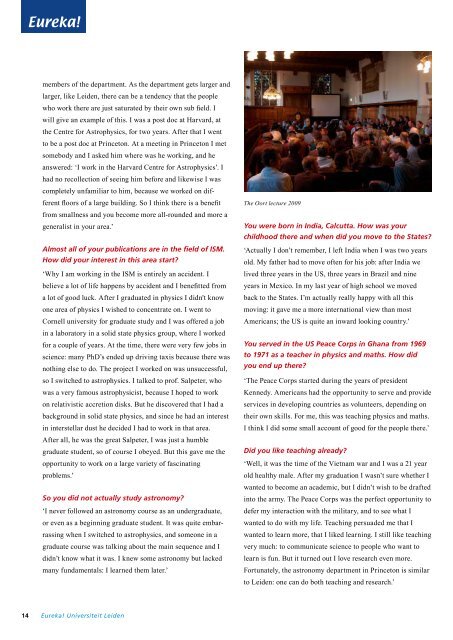De sleutel in een bewijs
De sleutel in een bewijs
De sleutel in een bewijs
You also want an ePaper? Increase the reach of your titles
YUMPU automatically turns print PDFs into web optimized ePapers that Google loves.
14<br />
Eureka!<br />
members of the department. As the department gets larger and<br />
larger, like Leiden, there can be a tendency that the people<br />
who work there are just saturated by their own sub field. I<br />
will give an example of this. I was a post doc at Harvard, at<br />
the Centre for Astrophysics, for two years. After that I went<br />
to be a post doc at Pr<strong>in</strong>ceton. At a meet<strong>in</strong>g <strong>in</strong> Pr<strong>in</strong>ceton I met<br />
somebody and I asked him where was he work<strong>in</strong>g, and he<br />
answered: ‘I work <strong>in</strong> the Harvard Centre for Astrophysics’. I<br />
had no recollection of see<strong>in</strong>g him before and likewise I was<br />
completely unfamiliar to him, because we worked on different<br />
floors of a large build<strong>in</strong>g. So I th<strong>in</strong>k there is a benefit<br />
from smallness and you become more all-rounded and more a<br />
generalist <strong>in</strong> your area.’<br />
Almost all of your publications are <strong>in</strong> the field of ISM.<br />
How did your <strong>in</strong>terest <strong>in</strong> this area start?<br />
‘Why I am work<strong>in</strong>g <strong>in</strong> the ISM is entirely an accident. I<br />
believe a lot of life happens by accident and I benefitted from<br />
a lot of good luck. After I graduated <strong>in</strong> physics I didn't know<br />
one area of physics I wished to concentrate on. I went to<br />
Cornell university for graduate study and I was offered a job<br />
<strong>in</strong> a laboratory <strong>in</strong> a solid state physics group, where I worked<br />
for a couple of years. At the time, there were very few jobs <strong>in</strong><br />
science: many PhD’s ended up driv<strong>in</strong>g taxis because there was<br />
noth<strong>in</strong>g else to do. The project I worked on was unsuccessful,<br />
so I switched to astrophysics. I talked to prof. Salpeter, who<br />
was a very famous astrophysicist, because I hoped to work<br />
on relativistic accretion disks. But he discovered that I had a<br />
background <strong>in</strong> solid state physics, and s<strong>in</strong>ce he had an <strong>in</strong>terest<br />
<strong>in</strong> <strong>in</strong>terstellar dust he decided I had to work <strong>in</strong> that area.<br />
After all, he was the great Salpeter, I was just a humble<br />
graduate student, so of course I obeyed. But this gave me the<br />
opportunity to work on a large variety of fasc<strong>in</strong>at<strong>in</strong>g<br />
problems.’<br />
So you did not actually study astronomy?<br />
‘I never followed an astronomy course as an undergraduate,<br />
or even as a beg<strong>in</strong>n<strong>in</strong>g graduate student. It was quite embarrass<strong>in</strong>g<br />
when I switched to astrophysics, and someone <strong>in</strong> a<br />
graduate course was talk<strong>in</strong>g about the ma<strong>in</strong> sequence and I<br />
didn’t know what it was. I knew some astronomy but lacked<br />
many fundamentals: I learned them later.’<br />
Eureka! Universiteit Leiden<br />
The Oort lecture 2009<br />
You were born <strong>in</strong> India, Calcutta. How was your<br />
childhood there and when did you move to the States?<br />
‘Actually I don’t remember, I left India when I was two years<br />
old. My father had to move often for his job: after India we<br />
lived three years <strong>in</strong> the US, three years <strong>in</strong> Brazil and n<strong>in</strong>e<br />
years <strong>in</strong> Mexico. In my last year of high school we moved<br />
back to the States. I’m actually really happy with all this<br />
mov<strong>in</strong>g: it gave me a more <strong>in</strong>ternational view than most<br />
Americans; the US is quite an <strong>in</strong>ward look<strong>in</strong>g country.’<br />
You served <strong>in</strong> the US Peace Corps <strong>in</strong> Ghana from 1969<br />
to 1971 as a teacher <strong>in</strong> physics and maths. How did<br />
you end up there?<br />
‘The Peace Corps started dur<strong>in</strong>g the years of president<br />
Kennedy. Americans had the opportunity to serve and provide<br />
services <strong>in</strong> develop<strong>in</strong>g countries as volunteers, depend<strong>in</strong>g on<br />
their own skills. For me, this was teach<strong>in</strong>g physics and maths.<br />
I th<strong>in</strong>k I did some small account of good for the people there.’<br />
Did you like teach<strong>in</strong>g already?<br />
‘Well, it was the time of the Vietnam war and I was a 21 year<br />
old healthy male. After my graduation I wasn’t sure whether I<br />
wanted to become an academic, but I didn’t wish to be drafted<br />
<strong>in</strong>to the army. The Peace Corps was the perfect opportunity to<br />
defer my <strong>in</strong>teraction with the military, and to see what I<br />
wanted to do with my life. Teach<strong>in</strong>g persuaded me that I<br />
wanted to learn more, that I liked learn<strong>in</strong>g. I still like teach<strong>in</strong>g<br />
very much: to communicate science to people who want to<br />
learn is fun. But it turned out I love research even more.<br />
Fortunately, the astronomy department <strong>in</strong> Pr<strong>in</strong>ceton is similar<br />
to Leiden: one can do both teach<strong>in</strong>g and research.’


